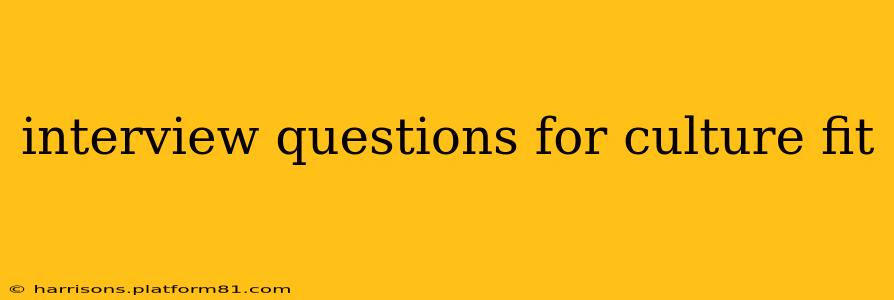Interview Questions for Culture Fit: Uncovering the Right Person for Your Team
Finding a candidate with the right skills is crucial, but equally important is finding someone who's a good culture fit. A strong culture fit contributes significantly to employee retention, team morale, and overall productivity. This article explores effective interview questions designed to assess culture fit, going beyond surface-level pleasantries to uncover a candidate's true personality and work style. We'll cover various aspects of culture, ensuring a holistic evaluation.
Understanding Your Company Culture First:
Before diving into questions, honestly assess your company culture. What are your core values? What's the typical work environment like? Is it fast-paced, collaborative, independent, formal, or informal? Defining your ideal cultural profile is the first step to finding the right fit.
Types of Interview Questions to Assess Culture Fit:
Here are some categories of questions, with examples, to help you assess culture fit during the interview process:
1. Behavioral Questions (Past Behavior Predicts Future Behavior):
These questions explore how candidates have handled situations in the past, providing insight into their work style and values.
- "Tell me about a time you disagreed with a colleague or supervisor. How did you handle the situation?" This reveals conflict resolution skills and team dynamics approach.
- "Describe a challenging project you worked on. What were the obstacles, and how did you overcome them?" This assesses problem-solving abilities, resilience, and resourcefulness.
- "Give me an example of a time you had to adapt to a significant change at work. How did you respond?" This gauges adaptability and flexibility in a dynamic work environment.
- "Tell me about a time you made a mistake. What did you learn from it?" This reveals self-awareness, accountability, and a willingness to learn.
- "Describe a time you went above and beyond your job description. Why did you do it?" This highlights commitment, initiative, and alignment with company values.
2. Situational Questions (Hypothetical Scenarios):
These questions present hypothetical situations to gauge a candidate's response and decision-making process within the context of your company culture.
- "Imagine a project is behind schedule. How would you address the situation and keep the team motivated?" This reveals leadership skills, problem-solving abilities, and team management style.
- "If you witnessed a colleague behaving unethically, how would you handle it?" This assesses ethical awareness and integrity.
- "Let's say a team member is consistently underperforming. How would you approach the situation?" This explores conflict resolution, mentorship abilities, and proactive problem-solving.
- "How do you handle pressure and tight deadlines?" This explores stress management and work ethic.
3. Questions Focused on Values and Preferences:
These questions directly assess alignment with your company's core values.
- "What are your ideal work conditions and team dynamics?" This reveals preferences for collaboration, independence, or a specific work style.
- "What are your career aspirations, and how do you see them aligning with our company's goals?" This assesses long-term commitment and alignment with company vision.
- "What excites you most about this opportunity?" This reveals genuine interest and passion for the role and company.
- "What are your strengths and weaknesses?" This is a classic question, but in the context of culture fit, focus on how these attributes impact team collaboration and dynamics.
- "What kind of work environment do you thrive in?" This directly assesses compatibility with your company's atmosphere.
4. Questions to Uncover Personality and Work Style:
These questions delve into the candidate's personality and preferences to gauge compatibility with your team.
- "How would you describe your communication style?" This reveals preferred communication channels and methods.
- "How do you handle feedback? Give me an example." This demonstrates receptiveness to constructive criticism and self-improvement.
- "Describe your ideal team. What qualities are important to you in a team member?" This provides insights into their teamwork preferences and compatibility.
- "How do you stay motivated and engaged in your work?" This reveals their intrinsic drive and alignment with the company's motivational factors.
How to Effectively Use These Questions:
- Listen Actively: Pay attention not just to what candidates say, but also how they say it. Body language and tone of voice offer valuable insights.
- Follow-up Questions: Ask clarifying questions to delve deeper into their responses.
- Avoid Leading Questions: Phrase your questions neutrally to avoid influencing the candidate's response.
- Compare and Contrast: Compare responses across multiple candidates to assess relative fit with your company culture.
By thoughtfully integrating these questions into your interview process, you'll significantly improve your chances of finding candidates who are not only skilled but also a perfect cultural fit for your team, leading to increased employee satisfaction, productivity, and long-term success. Remember to always maintain a professional and respectful approach throughout the interview process.
